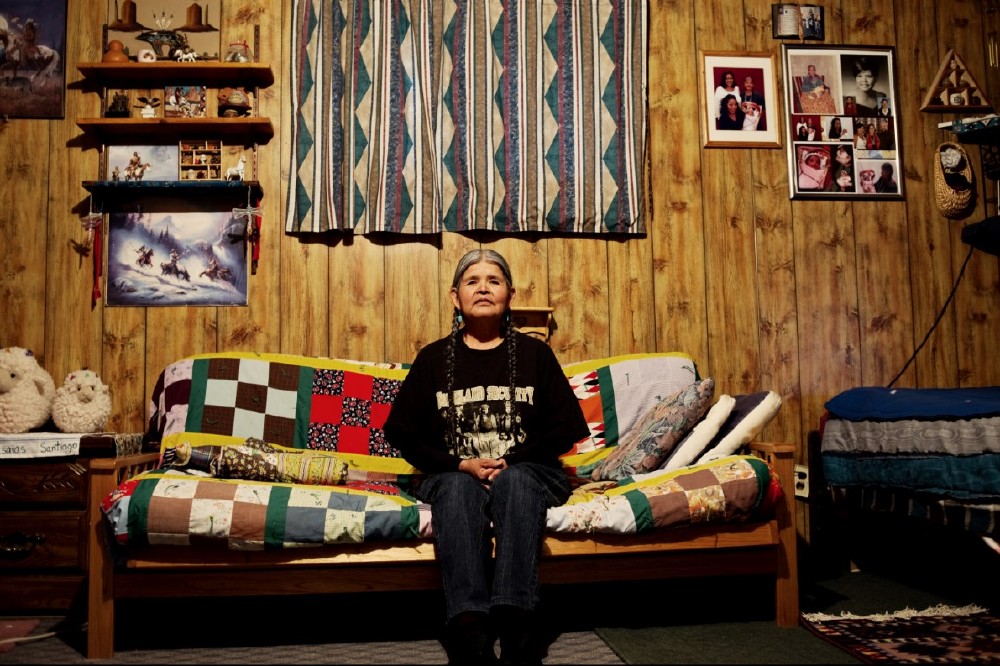Despite our knowledge of horrific civil rights abuses that are still happening all over the world, it's impossible to get over the shock of learning that medieval methods of population control are still occurring in Western societies. Native American people have been the subject of some of the most vile injustices in history, and director Lorna Tucker's new documentary Amá unveils some of these stories in heart-breaking detail.

Jean Whitehorse in Amá
The word "amá" means "mother" and, as the documentary opens, we are introduced to a Native American mother whose strength of character and moral conviction is a credit to her community and womankind in general. Jean Whitehorse has suffered terribly in her life thanks to the US government. From the moment she was born, her life was being controlled by white society.
When she fell pregnant with her daughter, she was almost forced to sign over the child for adoption because of her lack of health insurance. Then years later she went to hospital for an appendectomy and came out with a scar in the wrong place. Unbeknownst to her she had been sterilised against her will.
Jean spent a huge part of her life wondering why she had been the victim of such a cruel act, never realising that across the country her friends and peers were suffering the same fate. We hear the story of Yvonne Swan, who was forced to undergo a full hysterectomy and never told anybody.
This is one of the painful truths of this tragedy: women even now will not share their own traumatic experiences out of shame. If Lorna Tucker can achieve anything with this film, it's that it will go a long way in opening up this conversation and enforcing solidarity between women.
An interview with tubal reversal specialist Dr. Bernard Rosenfeld shed further light on medical practises when it came to sterilisation. His medical license was almost revoked after he reported some of the clinics where unethical practises were taking place; a baffling turn of events when one considers where the side of "immoral conduct" truly lay. Bernard was shocked to discover that at one point 94% of obstetricians favoured the sterilisation of women who had had three or more illegitimate children.
The hypocrisy of this statistic is startling. That information next to a video placing huge emphasis on careful consideration and choice in matters of vasectomies and tubal ligations forces you to wonder if the US healthcare system can be trusted at all.
It was impressive to see that Lorna managed to show a degree of objectivity to the story. What could possibly justify what we were hearing? Nonetheless, Dr. Reimert Ravenholt, an important figure in US population control back in the 70s, tried his best. He revealed how mass sterilisation was part of the government's war on poverty; the logic being that the procedure would keep population down, and therefore alleviate poverty.
But that attitude in itself is part of the big problem: the fact that there are people in this world who can't see anything beyond the "American dream" of money and land being the key to wealth and happiness. As we can see from Jean's life, Native American culture puts family and tradition as the ultimate thing to strive for.
Jean Whitehorse is a fascinating woman with so much wit and charm despite what she has had to live through. She and other indigenous peoples have been dehumanised for centuries, which probably makes it easy for people to ignore the kinds of horrendous abuses they've suffered. But seeing a woman like Jean, an ordinary woman with a family and a home and a job, drives home just how inhumane the government's methods of "population control" have been.
Textured with remarkable footage, the documentary also deals with issues far beyond forced sterilisation; from the enslavement of Navajo people during the Navajo Long Walk to Fort Sumnar in 1864 to the building of the Dakota access pipeline. The only positive things that have come out of such hardships is that it has brought opposing tribes together.
We leave the film with the miserable knowledge that the tragedy is not yet over. The oppression continues for indigenous people all over America. Women are still being coerced and lied to long after the laws have changed to make it harder to do so. Not only have unethical medical practises devastated thousands of families and lives, they actually destroyed entire tribes. It falls under the definition of genocide, and yet the Native American people never had any apology for it.
Lorna does a great job of showing how small communities have been embarking on programs to protect Native American culture and language. Charon Asetoyer, for example, set up a radio station in a bid to share information across the country; and when you see people like Jean healing herself by immersing herself in her own culture, you realise just how important that is.
The themes are sensitively handled throughout. In a documentary like this, it would be easy to over-exalt a culture with so much beauty and wisdom, and while it does give insight into the indigenous way of life, there is never that sense of alienation from the viewer. The lighter moments are almost jarring next to such heart-wrenching accounts, but go a long way in showing the humanity the government has tried so long to destroy.
Sign this petition on Change.org to get the US Government to offer a public apology to Native American Women.

